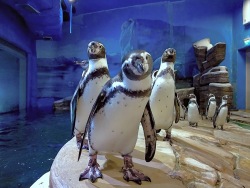Primorsky Aquarium to celebrate World Penguin Day

On April 25th all people around the world celebrate World Penguin Day. The date is chosen because it coincides with the start of the annual northern migration of Adelie penguins. World Penguin Day aims to raise awareness about these birds and biodiversity in general. The Primorsky Aquarium is going to join the global celebration and to host a special event on Saturday, April 23rd.
Penguins are a large family of aquatic flightless birds comprising 19 species. A lot of people think that penguins live only at the South Pole. In fact, these birds are not restricted to the Antarctica, but are found all across the Southern Hemisphere: along the Antarctic coast, in New Zealand, the southern part of Australia, South Africa and South America from the Falkland Islands to Peru and the Galapagos Islands at the Equator.
“We’ve prepared a fantastic range of activities. Visitors will learn about a variety of penguin species, their life and relations with humans, for instance, why people knit special sweaters for penguins and what this fact has to do with ecology,” – tells Elena Sumka, Principal Specialist of the Education Department. “The Primorsky Aquarium will run a treasure hunt. At their joint press-conference, the penguin keeper and her feathered friends will answer all the questions our guests are looking forward to asking them, even the trickiest ones. Also, several hands-on activities will encourage participants to express themselves through the art.”
The Humboldt penguin from South America is the species kept at the Primorsky Aquarium. It is listed as Vulnerable by the IUCN Red List. Luckily, these birds adapt well to captivity and breed successfully in zoos and aquariums all around the world, which helps to tackle the problem of their conservation. At the end of 2021 as many as six pairs of Humboldt penguins hatched eight chicks at the Primorsky Aquarium due to constant efforts of specialists to create the most favorable conditions similar to their natural habitat.